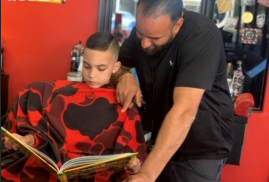(单词翻译:单击)
听力文本
Books and Barbers: How a Haircut Is Helping Students Read
Summer time in the U.S. usually means slower days, and no school.
"Yes it's summer, my time of year…"
Teachers know, however, that summer vacation means students will likely fall behind, and forget things they learned during the year. Simon Vanderpool, a special education teacher in Lexington, Kentucky, decided to do something about it.
He started a program called Books and Barbers. Children go to the barber, chose a book and read out loud while the barber cuts their hair. The child gets a sticker and can take the book home.
And there is an added bonus: money. The kids get paid to read. The program is for children ages about 5 to 12. There is no limit to the number of haircuts they can get.
Vanderpool says barber shops are places where kids can feel comfortable.
"Once a student feels comfortable, that's whenever the brain opens up, and that they are able to start focusing on nothing but learning."
He says last year, teachers at his school noticed "a huge difference" between kids who were in summer reading programs, and those who were not.
Austin Lopez is seven years old. In the fall he will be in second grade. His mom, Amanda Lopez, brings him to Prince Cuts Barbershop in Lexington. First, Austin says, he chooses a book from the shelf full of colorful ones.
"Well, then I go on a chair to go to the barber, I mean, like get my haircut and then while he's doing my haircut, I read the book."
And what does he likes about reading?
"That you get to learn."
This day, he will be reading a book about the popular cartoon "Angry Birds." The books for the program are donated by fellow teachers, people who heard about the program and the International Book Project.
Austin's favorite books are encyclopedias. Sometimes he says, he is a little worried about reading out loud.
"Sometimes I get words wrong in those books I like."
That is where the barber can help. Amir Shalash owns the barber shop. But he is doing more than cutting Austin's hair. He is listening to him read, and helping him with his reading. Shalash says all the children ask for help, and that opens a chance to connect.

"They reach out to us, and they're like, 'what's this word say?' And we'll help them out, you know. Kind of give them a little insight on it. We engage with the story so it's like, we'll listen to what they're saying, we'll kind of engage back with them, kind of get them into the book a little bit more."
Austin's mom, Amanda Lopez, praises the program:
"They truly encourage reading, which, my son loves to read and, you know, education is truly important, for all of us parents."
Shalash says the money gives the children a good reason to try reading out loud. The parent is charged $16 for the haircut and the child is given $3 either to spend right away, or to save for something later.
Simon Vanderpool says the money provides an important lesson about saving.
"The overall picture of giving that, is to not only increase their engagement within the program, but to also see the lesson of being able to save money and to invest their money as well."
Austin Lopez is saving his money to buy a new Lego toy set.
Most of the children getting haircuts at barber shops are boys. Vanderpool's idea was to do more than just help them with reading and money. The teacher wants to help kids who are growing up in a home without a father--like he did.
"Also, I created the program in order to provide a positive mentor for the kids that go into the barber shop, and are able to have someone that they can rely on and they can trust in, and just build a bond between the two of them."
The organization fatherhood.org reports that at least one in four American children lives without their father in the home.
Austin Lopez's mom says having a man pay attention and listen to her son is helpful.
"As a single mom, I definitely love how the guys in the barber shop, they actually reach out to our kids and they actually try to be in their lives. That means a lot to me, and I know my son as well."
Shalash says he and his fellow barbers like being mentors.
"The biggest thing is that we try to influence as many kids as we can, and that was my whole intention of it."
Vanderpool is spreading the program to more barber shops in Lexington and in Ohio. He is also talking with hair salons to start programs aimed at girls. And, he has started a new nonprofit to bring professional athletes to barber shops to read with children.
In the fall, Vanderpool begins his second year of teaching. This time, he will be working in a high school. He, the barbers, the parents and the children all believe that the students' reading levels will show that they took the time to read this summer.
And when he starts second grade, Austin Lopez should do well in reading, as well as in his favorite subject — math.
I'm Anne Ball.
重点解析
重点讲解:
1. fall behind 落后;跟不上;
Put on a spurt, or you'll fall behind.
他们设立了一个特别工作组来调查这个问题。
2. read out 大声读;朗读;
He began to read out loud.
他开始大声读起来。
3. full of 装满;堆满;
The sink was full of dirty dishes.
水槽里堆满了脏碟子。
4. grow up 成长;长大;
She grew up in Tokyo.
她在东京长大。
参考译文
书籍和理发师:理发如何帮助学生阅读
在美国,夏天通常意味着日子过得慢悠悠,还不用上学。
“是的,现在是夏天,一年中属于我的时光......”
然而,老师们知道,暑假意味着学生们很可能会掉队,忘记本年度中学过的知识。西蒙·范德普尔是肯塔基州列克星敦市的一名特殊教育教师,他决定为此采取些行动。
他发起一个名为书籍与理发师的项目。孩子们去理发店,挑选一本书,在理发师为他们剪头发时大声朗读。孩子可以得到一张贴纸,还能把书带回家。
还有一个额外的好处:挣钱。孩子们朗读可以挣钱。这个项目面向5至12岁的儿童,对他们剪头发的次数没有限制。
范德普尔说,理发店是可以让孩子们感到舒适的地方。
“学生感到舒服时,大脑会处于开放状态,他们就能开始专注于学习。”
他说,去年,他所在学校的老师注意到,参加暑期阅读项目的孩子和没参加的孩子之间存在“巨大差异”。
奥斯汀·洛佩兹七岁,秋天他就要上二年级了。他的妈妈阿曼达·洛佩兹带他去列克星敦的王子理发店。奥斯汀说,他先从放着五颜六色书籍的书架上挑选一本书。
“然后我坐在椅子上等理发师给我剪头发,他给我理发时,我就朗读那本书。”
他为什么喜欢阅读?
“通过阅读可以学习。”
今天,他要读一本关于流行动画片《愤怒的小鸟》的书。用于该项目的图书是由老师们、听说该项目的人,以及国际图书项目捐赠的。
奥斯汀最喜欢的是百科全书。他说,有时他有点担心大声朗读。
“有时,我会把自己喜欢的那些书中的内容读错。”
这就是理发师可以帮忙的地方了。阿米尔·沙拉什是理发店的老板,但他不仅是在给奥斯汀剪发。他还在聆听并帮助他阅读,沙拉什说所有的孩子都会请求帮助,这就开启了彼此之间的沟通。
“他们请求我们帮忙,他们说,‘这个词怎么念?’我们就帮助他们。让他们深入了解故事,我们参与到故事中,倾听他们在读什么,和他们一道更好地了解书中的内容。”
奥斯汀的妈妈,阿曼达·洛佩兹,称赞这个项目:
“确实能够鼓励阅读,我儿子喜欢阅读,教育对我们所有家长来说都非常重要。”
沙拉什说,报酬让孩子们有了大声朗读的好理由。父母支付16美元的理发费,孩子能得到3美元,可以马上花掉,也可以存起来以后用。
西蒙·范德普尔说,这个钱给孩子上了有关储蓄的重要一课。
“总体来看给孩子报酬,不仅可以增加孩子们参与项目的程度,而且还能掌握存钱与投资的经验。”
奥斯汀·洛佩兹正在存钱,准备买一套新的乐高玩具。
在理发店剪发的大多都是男孩子,范德普尔的想法不仅是帮助他们朗读和赚钱。这位老师还希望帮助那些在没有父亲的家里长大的孩子,就像他自己一样。
“我创办这个项目,还为了给迈入理发店的孩子们提供积极的指导,让他们能有一位可以依赖和信任的人,让他们之间建立起一种联结。”
fatherhood.org组织报道说,至少四分之一的美国儿童所生活的家中没有父亲。
奥斯汀·洛佩兹的妈妈说,让一位男性注意倾听儿子说话很有帮助。
“作为一个单身妈妈,我非常喜欢理发店里的男性和孩子们打交道的方式。他们在与孩子接触,试图融入孩子的生活。这对我和儿子来说,意义重大。”
沙拉什表示,自己和其他理发师都喜欢当指导者。
“最重要的是我们尝试影响尽可能多的孩子,这就这个项目的用意。”
范德普尔正在将该计划推广到列克星敦市和俄亥俄州的更多理发店中,他也与美发厅讨论启动针对女孩的项目。此外,他还创办了一个新的非营利组织,将职业运动员带到理发店和孩子们一起读书。
秋天时,范德普尔会开始他第二年的教学生涯。这次,他将在一所高中工作。他本人、理发师、家长和孩子们都相信,学生们的朗读水平将表明,他们在这个夏天花时间阅读了。
奥斯汀·洛佩兹上二年级时,应该能在阅读,以及他最喜欢的科目数学上都表现得更好。
安妮·鲍尔报道。
译文为可可英语翻译,未经授权请勿转载!


